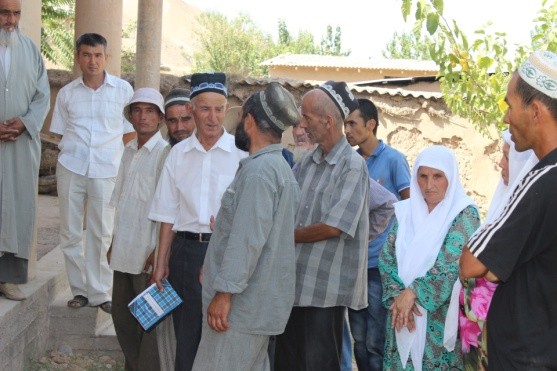
July 2014—Tajikistan, one of Central Asia’s poorest countries, is burdened with high rates of tuberculosis (TB). Limited funding for TB and extremely low infection control in hospitals have prompted the National TB Program to introduce cost-effective measures to shift more patients from hospital-based care to outpatient care, as recommended by the World Health Organization. Critical to this transition is ensuring adherence to treatment regimens and providing social and psychological support for patients.
To strengthen the delivery of outpatient TB care, in 2010, the USAID-funded TB CARE I project brought together health care providers, district authorities, activists and religious leaders in two pilot districts—Temurmalik and Danghara—to raise awareness of TB, improve diagnosis and care, and discuss how to support patients and families who undergo treatment. The project also established a psychological support task force as part of the National TB Program for experienced TB specialists to provide patient counseling services throughout the country.
The two pilot districts are now providing innovative social support services as an incentive for patients to adhere to their TB care, including relief from property taxes and utility payments, provision of food packages, and disability benefits. Currently, 28 patients in Temurmalik and 10 patients in Danghara receive social support from the government and local businesses, which has positively impacted their adherence to treatment.
“We used to look at TB as a medical issue but now realize that it has many social implications. We should not leave the patients to deal with the disease on their own,” said Jumakhon Kayumov, chairman of Tanobchi Township, Temurmalik district. “In our traditions, village communities always provide support to those in need and TB patients now can rely on our support as well.”
USAID has also helped streamline the process of applying for disease-related benefits from the Inter-regional Medical-Labor Commission. USAID assistance helped the commission increase the number of patients eligible for cash benefits from the government to 16 patients (including eight Multi-Drug Resistant TB patients) in Temurmalik and 14 patients (including four MDR-TB cases) in Danghara.
The model rolled out in Temurmalik and Danghara demonstrates how USAID assistance can promote a sustainable, resource-mobilizing approach appropriate for the conditions and traditions of each community, and how the assistance of government and local authorities is integral to the success of TB outpatient care.
The TB CARE I project runs from October 2010 to October 2014.
LINKS
Follow @USAIDCtrAsia, on Facebook, on Flickr, on YouTube







Comment
Make a general inquiry or suggest an improvement.